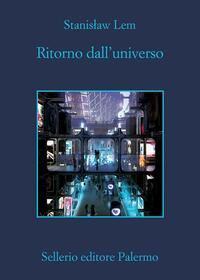Take a photo of a barcode or cover
adventurous
challenging
emotional
reflective
slow-paced
Plot or Character Driven:
Character
Strong character development:
Yes
Loveable characters:
No
Diverse cast of characters:
No
Flaws of characters a main focus:
Yes
Man, these Slavic writers take existentialism and suffering to strange places. Good SF, not too hard, but may be unlikeable to some readers of American SF. Lots of questions left unanswered (for the reader to ponder, no doubt), and more observations and complaints than there is narrative.
The storyline ends up unimportant, and none of the characters other than the protagonist "grow" or change in any way. I can see this being a bleak read for some. He introduces sociological concepts without (in the book) debating them or going into thought exercises about them.
Still good to read as part of the canon, though.
The storyline ends up unimportant, and none of the characters other than the protagonist "grow" or change in any way. I can see this being a bleak read for some. He introduces sociological concepts without (in the book) debating them or going into thought exercises about them.
Still good to read as part of the canon, though.
mysterious
reflective
slow-paced
Plot or Character Driven:
Character
Strong character development:
Complicated
Loveable characters:
No
Diverse cast of characters:
No
Flaws of characters a main focus:
Yes
challenging
dark
emotional
reflective
medium-paced
Plot or Character Driven:
A mix
Strong character development:
No
Loveable characters:
No
Diverse cast of characters:
No
Flaws of characters a main focus:
Complicated
Powrót z Gwiazd dzieli się na dwie, wyraźnie różne, części. Pierwsza to hard sci-fi w klimacie innych powieści mistrza, z którymi miałem przyjemność spędzić parę wieczorów, jednak nie mająca w sobie pierwiastka grozy, jakie ukrywała w sobie nowo odkryta dziedzina nauki (Dzienniki gwiazdowe, część opowiadań), "życie", które rozwijało się gdzieś w odległym kosmosie (Solaris) czy niekontrolowany rozwój technologii (Niezwyciężony). tl;dr: wracający z misji kosmicznej, w trakcie której na ziemi śmignęło niemal 150 lat, kosmonauta Hal próbuje odnaleźć się w całkowicie odmiennej rzeczywistości, w której już nikomu nie zależy na podboju kosmosu, a każda osoba jest pododawana zabiegowi trwale usuwającemu agresję - betryzacji.
I jest to część, od której pierwotnie się odbiłem kilka lat temu (może nie kilka a z dziesięć, bo to byłaby moja pierwsza książka Lema) ze względu na chaos, który wylewał się na mnie od pierwszych stron. Nie wgłębiając się dłużej w to co się we mnie zmieniło - dużą zasługą jest tu zdecydowanie świetny audiobook z podziałem na role, który uświadomił mi bardzo ważną rzecz - nasz protagonista jest tak samo w tym świecie zagubiony! To świetny zabieg, który doceniłem dopiero po latach, a uważam za niezbędny w przypadku tej konkretnej książki.
Druga część to dramat psychologiczny, w którym to Hal próbuje odszukać jakąkolwiek rzecz bądź uczucie, które będzie dla niego silniejsze od autodestrukcji, nad której przyciskiem zawiesił swój kciuk na długo przed tym, niż sami zdajemy sobie z tego sprawę. Rozmowy z przyjaciółmi - eks-kosmonautami, którzy byli z nim na misji są przesycone nihilizmem. Nastrój ogólnej rezygnacji zachodzi pod skórę, a wspomnienie obcej planety przez Hala mrozi krew w żyłach (nie wierze, że Lem nie był fanem literatury grozy, bo jest jednym z mistrzów budowania napięcia w kontekstach nieznanego zagrożenia).
Motyw przewodni, przewijający się tu i ówdzie komentarz o potrzebie wykonywania misji kosmicznych, to zdecydowanie zbyt mało wyeksploatowany temat w filmach (szczerze to z takim konkretnym założeniem jakie przedstawia tu Lem, a którego nie chcę zdradzać, to nie widziałem żadnego). Czytajcie, bo to jest po prostu cholernie świeże, nawet mimo ponad 50 lat (sic!) na karku.
I jest to część, od której pierwotnie się odbiłem kilka lat temu (może nie kilka a z dziesięć, bo to byłaby moja pierwsza książka Lema) ze względu na chaos, który wylewał się na mnie od pierwszych stron. Nie wgłębiając się dłużej w to co się we mnie zmieniło - dużą zasługą jest tu zdecydowanie świetny audiobook z podziałem na role, który uświadomił mi bardzo ważną rzecz - nasz protagonista jest tak samo w tym świecie zagubiony! To świetny zabieg, który doceniłem dopiero po latach, a uważam za niezbędny w przypadku tej konkretnej książki.
Druga część to dramat psychologiczny, w którym to Hal próbuje odszukać jakąkolwiek rzecz bądź uczucie, które będzie dla niego silniejsze od autodestrukcji, nad której przyciskiem zawiesił swój kciuk na długo przed tym, niż sami zdajemy sobie z tego sprawę. Rozmowy z przyjaciółmi - eks-kosmonautami, którzy byli z nim na misji są przesycone nihilizmem. Nastrój ogólnej rezygnacji zachodzi pod skórę, a wspomnienie obcej planety przez Hala mrozi krew w żyłach (nie wierze, że Lem nie był fanem literatury grozy, bo jest jednym z mistrzów budowania napięcia w kontekstach nieznanego zagrożenia).
Motyw przewodni, przewijający się tu i ówdzie komentarz o potrzebie wykonywania misji kosmicznych, to zdecydowanie zbyt mało wyeksploatowany temat w filmach (szczerze to z takim konkretnym założeniem jakie przedstawia tu Lem, a którego nie chcę zdradzać, to nie widziałem żadnego). Czytajcie, bo to jest po prostu cholernie świeże, nawet mimo ponad 50 lat (sic!) na karku.
The plot revolves around an astronaut returning to Earth after over a hundred years away only to find that society has changed drastically, with everyone undergoing "betrization" which eliminates all violence and lets Earth become a "utopia" where nearly everything is free and there's no violence or human evils. This Brave New World-esque plot is really interesting conceptually... unfortunately Lem spends the first half of this book basically just yapping about all the cool sci-fi stuff he imagined for this world instead of actually discussing it philosophically. The beginning chapters of this book basically read like "And then I took the gleeber-goober into the klepoplex where I met Zuzu who informed me my sweater was lame and I needed to buy the super-duper spray on pants from the Hooble Store." Its only in the second half of the book when the implications of a society where risk and danger are removed are explored... momentarily. The second half instead shifts primarily into a very weird romance where the age old trope of "characters who just met and know nothing about each other fall in love" constitutes basically the entire focus of the novel until the last chapter, where for some reason out main character has just decided he actually doesnt hate this world for whatever reason and is happy to skip out on what he's been desiring for the entirety of the story up until now. A lot of wasted potential here and not Lem's best.
challenging
informative
mysterious
reflective
slow-paced
Plot or Character Driven:
A mix
Strong character development:
No
Loveable characters:
No
Flaws of characters a main focus:
Complicated
Still one of my favourite ever reads. This is a complicated book, not in its premise, but in its execution and even years after I first read it, I am in awe at how Lem accomplished writing about a world that is ours, yet so alien to everything we know today.
Hal returns from a mission to space and discovers that more than a century has passed and everyone and everything he once knew is gone and changed.
What really stuck with me was how, as the reader, you are just as astonished by this strange world as the protagonist is, and without having to explain every little thing (quite the opposite really) the world building still feels so thought out and elaborate, that you can't help but be puzzled and intrigued by it all, especially the things that are never explained. It is simply not needed.
The ending felt a bit... rushed in parts, but I can't give it any less than five stars, just for the brilliant writing style and ideas alone. Lem is one of the only authors I know, who manages to write such fantastical things with that very real sense of place about them, and a strong philosophy, always posing cutting questions to the readership.
To shorten any other gushing paragraphs I could be writing: I love Lem, I love this book, and I would recommend it to anyone, especially sci fi lovers and everyone who likes engaging and thought provoking literature. Wont get into the plot of the book in the slightest here, as it is complicated and best enjoyed while reading for yourself. So what are you waiting for?
Hal returns from a mission to space and discovers that more than a century has passed and everyone and everything he once knew is gone and changed.
What really stuck with me was how, as the reader, you are just as astonished by this strange world as the protagonist is, and without having to explain every little thing (quite the opposite really) the world building still feels so thought out and elaborate, that you can't help but be puzzled and intrigued by it all, especially the things that are never explained. It is simply not needed.
The ending felt a bit... rushed in parts, but I can't give it any less than five stars, just for the brilliant writing style and ideas alone. Lem is one of the only authors I know, who manages to write such fantastical things with that very real sense of place about them, and a strong philosophy, always posing cutting questions to the readership.
To shorten any other gushing paragraphs I could be writing: I love Lem, I love this book, and I would recommend it to anyone, especially sci fi lovers and everyone who likes engaging and thought provoking literature. Wont get into the plot of the book in the slightest here, as it is complicated and best enjoyed while reading for yourself. So what are you waiting for?
reflective
medium-paced
Ok, veo la premisa y me atrae su potencial.
Un hombre que tras un viaje espacial vuelve a la tierra ciento veintisiete años en el futuro. La sociedad ha cambiado enormemente porque se ha implantado un proceso que erradica la violencia. Cool. Aún así no tengo unas expectativas muy altas porque escribir ciencia ficción enfocado en el futuro es algo muy complicado pero... no es ese el problema de este libro.
El problema es que el protagonista es alguien con quien es imposible conectar. No tengo claro si es una descripción de un caso de estrés post traumático o simplemente que el tío es un violador en potencia. Pero me es difícil imaginarme a una persona tan impulsiva e ilógica.
Pero el mayor problema de esta historia son los diálogos. Al principio pensaba que la traducción era muy mala, y busqué la versión original para comparar. En efecto, no era la traducción, sino que simplemente no tienen mucho sentido.
Los personajes aparecen y desaparecen sin más, y salvo las últimas cinco páginas, no hay ninguna evolución en el protagonista.
En fin... que no entiendo la puntuación tan buena que tiene este libro en goodreads.
Un hombre que tras un viaje espacial vuelve a la tierra ciento veintisiete años en el futuro. La sociedad ha cambiado enormemente porque se ha implantado un proceso que erradica la violencia. Cool. Aún así no tengo unas expectativas muy altas porque escribir ciencia ficción enfocado en el futuro es algo muy complicado pero... no es ese el problema de este libro.
El problema es que el protagonista es alguien con quien es imposible conectar. No tengo claro si es una descripción de un caso de estrés post traumático o simplemente que el tío es un violador en potencia. Pero me es difícil imaginarme a una persona tan impulsiva e ilógica.
Pero el mayor problema de esta historia son los diálogos. Al principio pensaba que la traducción era muy mala, y busqué la versión original para comparar. En efecto, no era la traducción, sino que simplemente no tienen mucho sentido.
Los personajes aparecen y desaparecen sin más, y salvo las últimas cinco páginas, no hay ninguna evolución en el protagonista.
En fin... que no entiendo la puntuación tan buena que tiene este libro en goodreads.




